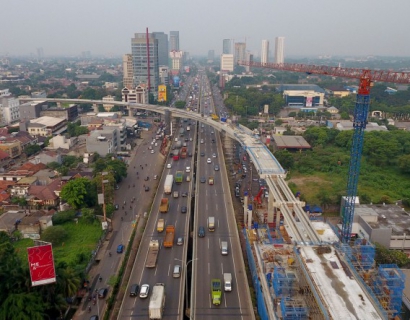Everything for  Business
Business
 Business
Business
 Business
Business
Widodo looks to private sector, China for infrastructure funds
Cash-strapped government has committed just $15 billion

Indonesian President Joko Widodo is still chasing some $150 billion to fund his ambitious nation-building agenda, almost half-way into a five-year infrastructure plan.
Widodo, known as Jokowi, needs outside money for his nation-building program after government revenues were battered by the end of the commodities boom and as tax compliance remains poor. With China making a massive push to build infrastructure and new trade routes across Asia through its Belt and Road Initiative, the world’s second-largest economy looms large as an obvious backer for Jokowi’s plans.
“In reality, there is only handful of countries with a surplus of money,” Rainier Haryanto, the program director of the Indonesian government’s Committee to Accelerate Priority Infrastructure, said in an interview in Jakarta. “The U.S., they are in debt. The Japanese, they are also in debt,” he said, but the Chinese have the money to lend. “At the end of the day, cash is king.”
As Southeast Asia’s biggest economy continues to struggle for revenue, the Widodo government is leaning even more on the private sector. It’s estimated the state budget will only be able to fund about $25 billion of the projects that are yet to start, while Indonesia’s legions of state-owned companies -- numbering in the hundreds -- will account for some $48 billion. About $83.5 billion will have to be stumped up by the private sector.
Some urgency may be required. The World Bank says Indonesia has a $1.5 trillion infrastructure gap compared to other emerging economies. A lack of good roads and transport corridors across the archipelago -- a string of more than 17,000 islands that would stretch from New York to London -- are adding to logistical barriers and driving up costs for business.
Of Jokowi’s pipeline of 245 projects, just six have been completed since the program started in 2016 at a cost of $976 million, according to Haryanto. There are a further 145 under construction, documents show.
“They are making good progress and momentum is building, considering that they had a relatively slow start,” said Euben Paracuelles, senior economist for Southeast Asia at Nomura Holdings Inc. in Singapore. “The fact that there is a lower contribution from the government budget reflects the criteria that they used to identify these projects, including the viability for the private sector to participate."
Even with the financing secured, projects have to overcome red tape and regulatory burdens. The $6 billion Jakarta to Bandung high-speed rail, billed as a showpiece of Jokowi’s plans, starkly illustrates the challenge. The project has all but ground to a halt after becoming tangled in Indonesia’s infamous red tape. While construction was meant to begin in August 2016, only around half of the land needed for the 142-kilometer railway had been cleared as of September last year.
Indonesia’s regulatory framework, including a tricky permit process and day-to-day issues for investors that are "more to do with local governments" can often be a roadblock in the country’s development and growth, World Bank chief economist for Indonesia Frederico Gil Sander said in an interview.
"Improving the business environment has to be something that operates at all levels in order to ensure that there is more investment and there are more jobs created," he said.
Bloomberg.com
 What are you doing with your RV in the offseason?
What are you doing with your RV in the offseason?
 Adobe will buy online design startup Figma for $ 20 billion
Adobe will buy online design startup Figma for $ 20 billion
 To combat the gas crisis, Germany offers a new plan for cheap transit
To combat the gas crisis, Germany offers a new plan for cheap transit
 Porsche family seeks iPO buyout after tearful defeat
Porsche family seeks iPO buyout after tearful defeat
 Clubs and bars are popping up all over Manhattan, providing an alternative social hub and jobs.
Clubs and bars are popping up all over Manhattan, providing an alternative social hub and jobs.
This site uses cookies and other visitor identifiers for the convenience of each user. If you stay on our site after reading this message, it means that you have no objection to the use of these technologies. Learn more
